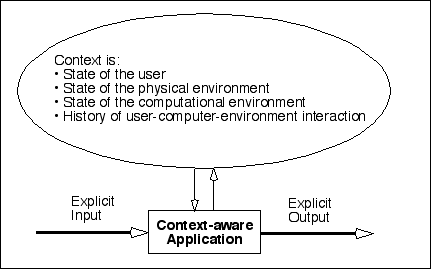
Henry Lieberman and Ted Selker

A growing realization is that computer systems will increasingly need to be sensitive to their context. Traditionally, hardware and software were conceptualized as input-output systems: systems that took input explicitly given to them by a human, and acted upon that input alone to produce an explicit output. Now, this view is being seen as being too restrictive. Smart computers, intelligent agent software, and digital devices of the future will have to operate on data that is not explicitly given to them, data that they observe or gather for themselves. These operations may be dependent on time, place, weather, user preferences, or the history of interaction. In other words, context.
But what exactly is context? We'll look at perspectives from software agents, sensors and embedded devices, and also contrast traditional mathematical and formal approaches. We'll see how each treats the problem of context, and discuss the implications for design of context-sensitive hardware and software.
IBM Systems Journal, Vol 39, Nos 3&4, pp. 617-631, 2000.